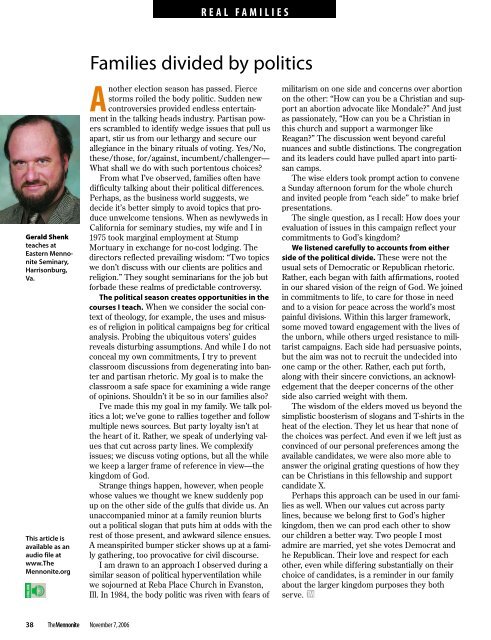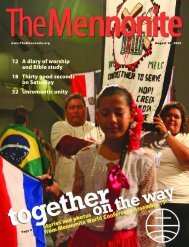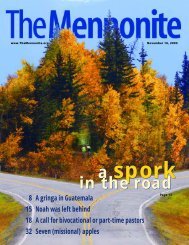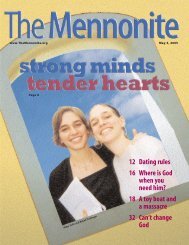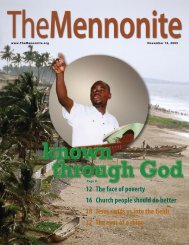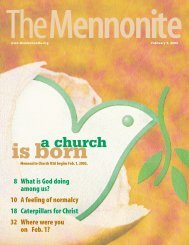11:7,6 - The Mennonite
11:7,6 - The Mennonite
11:7,6 - The Mennonite
You also want an ePaper? Increase the reach of your titles
YUMPU automatically turns print PDFs into web optimized ePapers that Google loves.
Gerald Shenk<br />
teaches at<br />
Eastern <strong>Mennonite</strong><br />
Seminary,<br />
Harrisonburg,<br />
Va.<br />
This article is<br />
available as an<br />
audio file at<br />
www.<strong>The</strong><br />
<strong>Mennonite</strong>.org<br />
38 <strong>The</strong><strong>Mennonite</strong> November 7, 2006<br />
REAL FAMILIES<br />
Families divided by politics<br />
Another election season has passed. Fierce<br />
storms roiled the body politic. Sudden new<br />
controversies provided endless entertainment<br />
in the talking heads industry. Partisan powers<br />
scrambled to identify wedge issues that pull us<br />
apart, stir us from our lethargy and secure our<br />
allegiance in the binary rituals of voting. Yes/No,<br />
these/those, for/against, incumbent/challenger—<br />
What shall we do with such portentous choices?<br />
From what I’ve observed, families often have<br />
difficulty talking about their political differences.<br />
Perhaps, as the business world suggests, we<br />
decide it’s better simply to avoid topics that produce<br />
unwelcome tensions. When as newlyweds in<br />
California for seminary studies, my wife and I in<br />
1975 took marginal employment at Stump<br />
Mortuary in exchange for no-cost lodging. <strong>The</strong><br />
directors reflected prevailing wisdom: “Two topics<br />
we don’t discuss with our clients are politics and<br />
religion.” <strong>The</strong>y sought seminarians for the job but<br />
forbade these realms of predictable controversy.<br />
<strong>The</strong> political season creates opportunities in the<br />
courses I teach. When we consider the social context<br />
of theology, for example, the uses and misuses<br />
of religion in political campaigns beg for critical<br />
analysis. Probing the ubiquitous voters’ guides<br />
reveals disturbing assumptions. And while I do not<br />
conceal my own commitments, I try to prevent<br />
classroom discussions from degenerating into banter<br />
and partisan rhetoric. My goal is to make the<br />
classroom a safe space for examining a wide range<br />
of opinions. Shouldn’t it be so in our families also?<br />
I’ve made this my goal in my family. We talk politics<br />
a lot; we’ve gone to rallies together and follow<br />
multiple news sources. But party loyalty isn’t at<br />
the heart of it. Rather, we speak of underlying values<br />
that cut across party lines. We complexify<br />
issues; we discuss voting options, but all the while<br />
we keep a larger frame of reference in view—the<br />
kingdom of God.<br />
Strange things happen, however, when people<br />
whose values we thought we knew suddenly pop<br />
up on the other side of the gulfs that divide us. An<br />
unaccompanied minor at a family reunion blurts<br />
out a political slogan that puts him at odds with the<br />
rest of those present, and awkward silence ensues.<br />
A meanspirited bumper sticker shows up at a family<br />
gathering, too provocative for civil discourse.<br />
I am drawn to an approach I observed during a<br />
similar season of political hyperventilation while<br />
we sojourned at Reba Place Church in Evanston,<br />
Ill. In 1984, the body politic was riven with fears of<br />
militarism on one side and concerns over abortion<br />
on the other: “How can you be a Christian and support<br />
an abortion advocate like Mondale?” And just<br />
as passionately, “How can you be a Christian in<br />
this church and support a warmonger like<br />
Reagan?” <strong>The</strong> discussion went beyond careful<br />
nuances and subtle distinctions. <strong>The</strong> congregation<br />
and its leaders could have pulled apart into partisan<br />
camps.<br />
<strong>The</strong> wise elders took prompt action to convene<br />
a Sunday afternoon forum for the whole church<br />
and invited people from “each side” to make brief<br />
presentations.<br />
<strong>The</strong> single question, as I recall: How does your<br />
evaluation of issues in this campaign reflect your<br />
commitments to God’s kingdom?<br />
We listened carefully to accounts from either<br />
side of the political divide. <strong>The</strong>se were not the<br />
usual sets of Democratic or Republican rhetoric.<br />
Rather, each began with faith affirmations, rooted<br />
in our shared vision of the reign of God. We joined<br />
in commitments to life, to care for those in need<br />
and to a vision for peace across the world’s most<br />
painful divisions. Within this larger framework,<br />
some moved toward engagement with the lives of<br />
the unborn, while others urged resistance to militarist<br />
campaigns. Each side had persuasive points,<br />
but the aim was not to recruit the undecided into<br />
one camp or the other. Rather, each put forth,<br />
along with their sincere convictions, an acknowledgement<br />
that the deeper concerns of the other<br />
side also carried weight with them.<br />
<strong>The</strong> wisdom of the elders moved us beyond the<br />
simplistic boosterism of slogans and T-shirts in the<br />
heat of the election. <strong>The</strong>y let us hear that none of<br />
the choices was perfect. And even if we left just as<br />
convinced of our personal preferences among the<br />
available candidates, we were also more able to<br />
answer the original grating questions of how they<br />
can be Christians in this fellowship and support<br />
candidate X.<br />
Perhaps this approach can be used in our families<br />
as well. When our values cut across party<br />
lines, because we belong first to God’s higher<br />
kingdom, then we can prod each other to show<br />
our children a better way. Two people I most<br />
admire are married, yet she votes Democrat and<br />
he Republican. <strong>The</strong>ir love and respect for each<br />
other, even while differing substantially on their<br />
choice of candidates, is a reminder in our family<br />
about the larger kingdom purposes they both<br />
serve. TM


